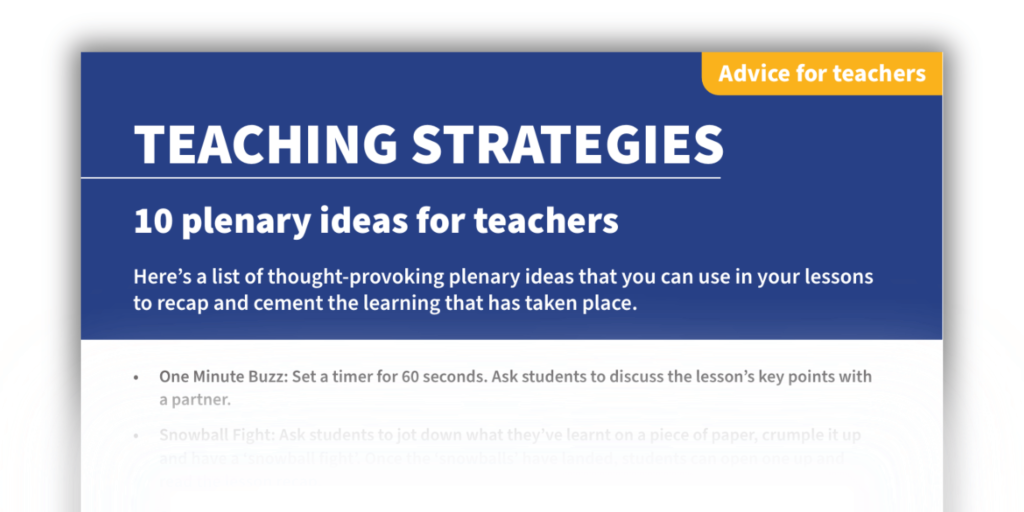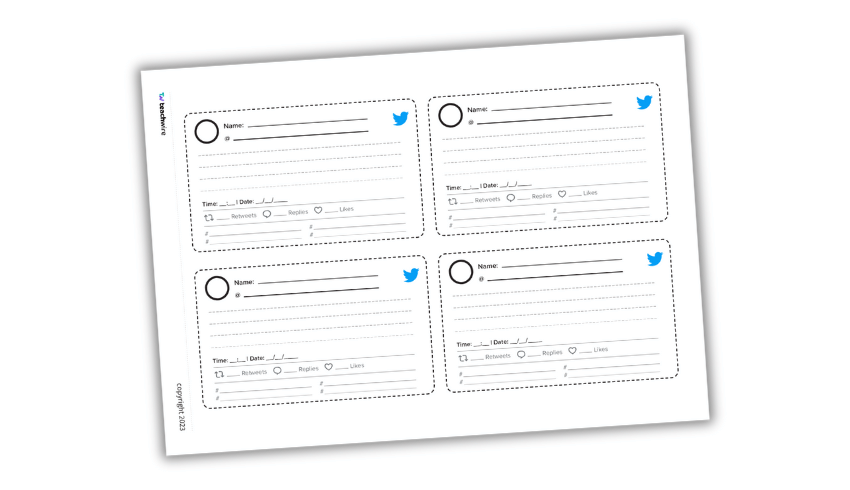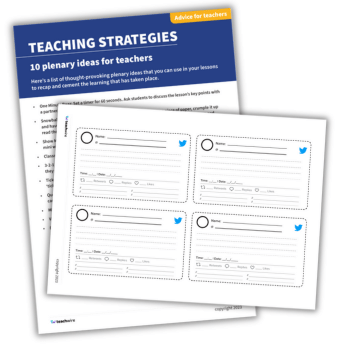Use these plenary ideas to assess learning in real time and get a snapshot of what students have learnt.
The free download contains ten thought-provoking plenary ideas for teachers, plus a worksheet themed around the idea of summarising learning via a tweet. See more information about this below.
What is a plenary?
You’ve just delivered a passionate lesson on the water cycle. The kids have been fantastic – their eyes wide with understanding, their pens moving furiously in their notebooks.
But now comes the crunch time, the grand finale: the plenary.
So, what exactly is a plenary? You can visualise it as the crowning jewel of your pedagogical masterpiece. It’s your golden opportunity to recap, synthesise, and cement the learning of the day.
“You can visualise it as the crowning jewel of your pedagogical masterpiece”
A little-known secret, however, is that a plenary does not necessarily have to be saved until the end of a session. Actually, interspersing mini plenary ideas throughout your lesson can create a robust learning rhythm.
Let’s unpack an assortment of inventive plenary ideas and potent tactics to optimise your plenary time…
The importance of planning
Effective plenaries are those segments in a lesson that help you ensure that students have comprehended and absorbed the day’s topics. They serve as a platform for reflection – a moment to pause and think about what has been learnt.
Alternatively, plenaries can function as a tool for summarising and reiterating the day’s key takeaways.
The most important thing to remember about effective plenaries is that you need to plan for them before the lesson. Carefully map them out to ensure the learning journey proceeds seamlessly and predictably.
Thoughtfully integrating plenaries into your lesson blueprint in advance will ensure smooth transitions, reinforce learning and cultivate a rich, productive classroom environment.

The power of mini plenaries
The true magic of mini plenaries is their flexibility. Like an unexpected plot twist in a gripping novel, they keep students on their toes.
“The true magic of mini plenaries is their flexibility”
You can use these brief, formative assessment opportunities to recap, reinforce or extend learning at any point. Keep the spark of engagement alive with a:
- Quickfire Q&A session
- Think pair share moment
- Rapid group discussion
The real strength of mini plenaries lies in their ability to help you assess learning in real time. This provides you with a snapshot of student comprehension and allows you to pivot the lesson’s direction if needed.
For instance, while teaching a lesson on multiplication, you might pause for a mini plenary that includes a quickfire round of multiplication problems.
By gauging the responses, you can decide if it’s time to move on to more complex problems or if you should devote more time to practising the basics.
Ultimately, these bite-sized checks on learning allow you to respond to your students’ needs dynamically, promoting more effective and responsive teaching.
Lesson starters
Don’t view the beginning of a new lesson as just a start. Rather, see it as an opportunity to anchor and trigger prior knowledge.
You can artfully craft these initial moments into what we can refer to as the ‘learning activation’ phase, much like a plenary.
English plenary ideas
English starters, for example, are a powerful tool to cement and reawaken previously learned concepts. For instance, using a ‘recall relay’ can be quite effective. Here, students rapidly jot down what they can remember from the unit of learning so far.
It’s a race against the clock that activates prior knowledge, much like warming up your muscles before a workout.
While these starters mark the beginning of a new learning journey, their true purpose aligns more with the consolidation aspect of plenaries.
They serve to embed past learnings in students’ minds and help them retrieve knowledge in an active, engaging manner.
5 minute starter activities such as this provide a launchpad for new information, ensuring a smooth and effective learning transition.
Making exit tickets exciting
Exit tickets provide an opportunity for formative assessment. They let you take the temperature of your students’ understanding of the day’s lesson.
They also stimulate introspection on the part of pupils. Urge students to reflect on their efforts and learning processes by using prompts like:
- How hard did you feel you worked today?
- What strategies could you have employed to enhance your learning?
Exit tickets establish an open line of communication between you, the teacher, and your students.
They leverage the power of primacy and recency effects. Studies show that students are most likely to remember what they learn at the beginning and end of a lesson. Hence, by concluding your class with an exit ticket, you are maximising a prime opportunity for learning.
They also encourage retrieval practice. When students are prompted to recall what they’ve learnt without the aid of textbooks or notes, they strengthen their long-term memory of the material.
Here are some more thought-provoking prompts you might consider for your exit tickets:
- Compose a tweet that encapsulates your understanding of today’s lesson
- What two aspects of today’s lesson resonated most with you?
- Imagine you have to explain today’s lesson to a young child. How would you explain it simply?
- Sum up the lesson in three points
Plenary Tweet Sheet

Download our Plenary Tweet Sheet from the top of this article. It’s a fun, creative way for students to encapsulate what they’ve learnt in the form of a tweet.
Tell pupils that it is their job to summarise the main learning points from today’s lesson in 280 characters or less – just like on Twitter. They need to be clear, concise and creative.
Crafting an effective plenary
Plenaries should be as dynamic and diverse as your students. They can range from formal debates and quizzes to reflective journal entries or group presentations.
Yet, the essence of an effective plenary is not its format, but its capacity to engage, assess and enhance learning. Remember, the best plenaries make students the protagonists of their learning journey.
Emma Cate Stokes is a freelance writer and former primary teacher.














